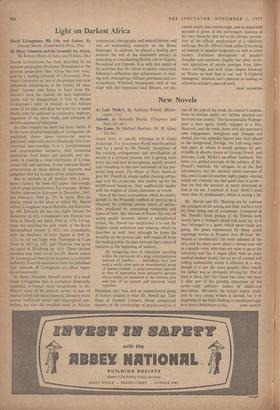Light on Darkest Africa
David Livingstone: His Life and Letters. By George Seaver. (Lutterworth Press, 35s.)
Sir Harry Johnston and the Scramble for Africa. By Roland Oliver. (Chatto and Windus, 30s.) DAVID LIVINGSTONE has been described by an eminent geographer (Professor Debenharn) as `the greatest geographer that Africa has ever seen,' and by a leading historian of Christianity (Pro- fessor Latourettc) as 'one of the greatest and most influential missionaries in the history of man- kind.' Anyone who hopes to learn from Dr. Seaver's book the reasons for such superlative praise will be disappointed. It fails to discuss Livingstone's work in relation to the African scene of his time, and does not even try to assess finally what he achieved as missionary, explorer, opponent of the slave trade, and advocate of British commercial enterprise.
In other respects the book has many merits. It is the most detailed biography of Livingstone yet published, draws upon manuscript sources previously neglected, and is refreshingly free from uncritical hero-worship. It is a straightforward and unpretentious narrative, with numerous quotations from letters and journals, and suc- ceeds in creating a vivid impression of Living, stone's life and opinions. It also contains shrewd observations on those defects of character and judgment that led to many of his misfortunes.
But to anybody at all familiar with Living- stone's history the book will appear distressingly full of simple factual errors. For example: Robert Moffat returned to Kuruman in December, 1843, not February, 1844 (p. 75); in April, 1844 (as clearly stated in the letter to which Dr. Seaver refers), Livingstone was at Mabotsa, not Kuruman (p. 80); Edwards did not join Inglis 'among the Baharutsi' (p. 83); Livingstone's son Thomas was born in March, not April, 1849 (p. 115); Living- stone was awarded the gold medal of the Royal Geographical Society in 1855, not immediately after the discOvery of Lake Ngami in 1849 (p. 123); he did not lodge with Thompson at Cape Town in 1852 (p. 147), and Chapman was never his guest at Kolobeng (p. 161). These careless mistakes may seem trivial but Dr. Seaver makes far too many of them to be accepted as a reliable authority. Even his quotations from the published Last Journals of Livingstone are often repro- duced incorrectly.
Sir Henry Johnston, himself author of a book about Livingstone that is nowadays deservedly neglected, is treated more scrupulously in Dr. Oliver's study of his political career. A man of marked talent and many interests, Johnston wrote several indifferent novels and biographical pot- boilers, but also did excellent work in African
exploration, ethnography and natural history, and was an outstanding authority on the Bantu languages. In addition, he played a leading part towards the end of the nineteenth century in extending or consolidating British rule in Nigeria, Nyasaland and Uganda. It is with that aspect of his activities that Dr. Oliver is mainly concerned. Johnston's difficulties and achievements in deal- ing with obstreperous African potentates and un- sympathetic Whitehall bureaucrats, and at one
stage with the imperious Cecil Rhodes, are dis- , cussed amply and convincingly, and an admirable account is given of the extravagant features in his own character that led to the abrupt termina- tion of his official employment at a relatively early age. But Dr. Oliver's book suffers from being an attempt at popular biography as well as sober history. Fictitious descriptions of people's thoughts and emotions, lengthy but often irrele- vant quotations of purple passages from John- ston's writings, and such inept chapter headings as 'Worse on land than at sea' and 'A frightful menagerie,' diminish one's pleasure in reading an otherwise scholarly piece of work.
ISAAC SCIIAPERA
































 Previous page
Previous page